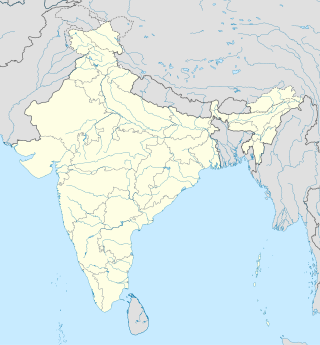
Veermata Jijabai Technological Institute (VJTI) is a state funded college located in Mumbai, Maharashtra, India. Founded in 1887 and formerly known as the Victoria Jubilee Technical Institute, it adopted its present name on 26 January 1997. VJTI is an academically and administratively autonomous institute, but it is affiliated to the University of Mumbai. The institute is financially supported by the Government of Maharashtra.
The National Institutes of Technology (NITs) are centrally funded technical institutes under the ownership of the Ministry of Education, Government of India. They are governed by the National Institutes of Technology, Science Education, and Research Act, 2007, which declared them institutions of national importance and laid down their powers, duties, and framework for governance. The act lists 31 NITs. Each NIT is autonomous and linked to the others through a common council known as the Council of NITSER, which oversees their administration. All NITs are funded by the Government of India.

The Khadi and Village Industries Commission (KVIC) is a statutory body formed in April 1957 by the Government of India, under the Act of Parliament, 'Khadi and Village Industries Commission Act of 1956'. It is an apex organisation under the Ministry of Micro, Small and Medium Enterprises, with regard to khadi and village industries within India, which seeks to - "plan, promote, facilitate, organise and assist in the establishment and development of khadi and village industries in the rural areas in coordination with other agencies engaged in rural development wherever necessary".

National Institute of Technology, Raipur is a public technical and research university located in Raipur, the capital of Chhattisgarh. Founded in 1956 with two engineering disciplines, namely Mining Engineering and Metallurgical Engineering, the institute focuses exclusively on science, technology, engineering, and architecture.
T. Kallupatti is a panchayat town in the Madurai district in the Indian state of Tamil Nadu.
The economy of Thiruvananthapuram, capital of the Indian state of Kerala, mostly consists of tourism and leisure, information technology, rubber plantations, coffee production, tea production, and education. There are many manufacturers, such as Travancore Titanium Products Ltd and English Indian Clays.

The Ministry of Textiles is an Indian government national agency responsible for the formulation of policy, planning, development, export promotion and regulation of the textile industry in India. This includes all natural, artificial, and cellulosic fibers that go into the making of textiles, clothing and Handicrafts.
Previously a neglected aspect of the Indian Central government, Education in Odisha is witnessing a rapid transformation. Its capital city, Bhubaneswar, is emerging as a knowledge hub in India with several new public and private universities, including the establishment of an Indian Institute of Technology after five decades of demand.

The Ministry of Micro, Small and Medium Enterprises is the ministry in the Government of India. It is the apex executive body for the formulation and administration of rules, regulations and laws relating to micro, small and medium enterprises in India. The Minister of Micro, Small and Medium Enterprises is Jitan Ram Manjhi.

The National Institutes of Technology, Science Education and Research Act, 2007 was enacted by the Parliament of India to declare India's National Institutes of Technology (NITs), Indian Institute of Engineering Science and Technology (IIEST) and Indian Institutes of Science Education and Research (IISERs) as Institutes of National Importance. The former Act received the assent of the President of India on 5 June 2007 and became effective on Independence Day, 2007. The National Institutes of Technology, Science Education and Research Act, 2007 is the second law for technical education institutions after the Indian Institutes of Technology Act of 1961.
Girijananda Chowdhury Institute of Management and Technology (GIMT) is an institute offering degree level technical courses in the State of Assam in the non-government sector established by Shrimanta Shankar Academy (SSA) Society. The college was established with permission from the state government and approval by the All India Council for Technical Education (AICTE), and is affiliated to Assam Science and Technology University.

Bangladesh University of Textiles, commonly referred to as BUTEX, is a public university in Bangladesh, situated in Tejgaon, Dhaka. It is the only public university in Bangladesh to teach textile engineering. The institution established education which sustains the entrepreneurship and industrialisation in the RMG industry of Bangladesh.

Higher education system in India includes both public and private universities. Public universities are supported by the union government and the state governments, while private universities are mostly supported by various bodies and societies. Universities in India are recognized by the University Grants Commission (UGC), which draws its power from the University Grants Commission Act, 1956. The main governing body is the University Grants Commission, which enforces its standards, advises the government, and helps coordinate between the center and the state. Accreditation for higher learning is overseen by various autonomous institutions established by the University Grants Commission (UGC).

The Tamil Nadu Handloom Weavers' Cooperative Society, popularly known as Co-optex, is a cooperative of traditional handloom weavers of the Indian state of Tamil Nadu. This is under the control of Department of Handlooms, Handicrafts, Textiles and Khadi of Government of Tamil Nadu. The organisation owns a number of shopping outlets in Tamil Nadu. Co-Optex also has an international arm, Co-optex International which exports its products to Germany, France, Netherlands, Belgium, Spain, Switzerland, Canada, Greece, Hong Kong, U.K. South Africa and the U.A.E.

Central Institute of Educational Technology is an autonomous organization, formed as a nodal agency under the National Council of Educational Research and Training (NCERT) for promoting the use of mass media technology for expanding and improving the quality of education at the school level. The institute is funded by the Ministry of Education, Government of India. The building is dedicated to Children of India and was built by Raj Rewal Associates in 1986

National Institute of Technology Puducherry, is an autonomous public technical and research university located in the city of Karaikal in Union Territory of Puducherry and is a coastal enclave in the basin of river Kaveri within the Nagapattinam District of Tamil Nadu. Founded and Established in 2010, it is one among the 31 National institutes of Technology of India and is declared as an Institute of National Importance by the Government of India under National Institutes of Technology, Science Education and Research Act, 2007.

Stand-Up India was launched by the Government of India on 5 April 2016 to support entrepreneurship among women and SC & ST communities. Stand Up India Loan Scheme is a government initiative launched by the Government of India in 2016 to promote entrepreneurship and facilitate bank loans to Scheduled Caste (SC) / Scheduled Tribe (ST) and women entrepreneurs in the country. The scheme aims to provide loans between Rs.10 lakhs and Rs.1 crore for setting up a greenfield enterprise in manufacturing, trading or services sector.

The National Institute of Technology Tiruchirappalli is a national research deemed university near the city of Tiruchirappalli in Tamil Nadu, India. It was founded as Regional Engineering College Tiruchirappalli in 1964 by the governments of India and Tamil Nadu under the affiliation of the University of Madras. The college was granted deemed university status in 2003 with the approval of the University Grants Commission (UGC), the All India Council for Technical Education (AICTE), and the Government of India and renamed the National Institute of Technology Tiruchirappalli.















